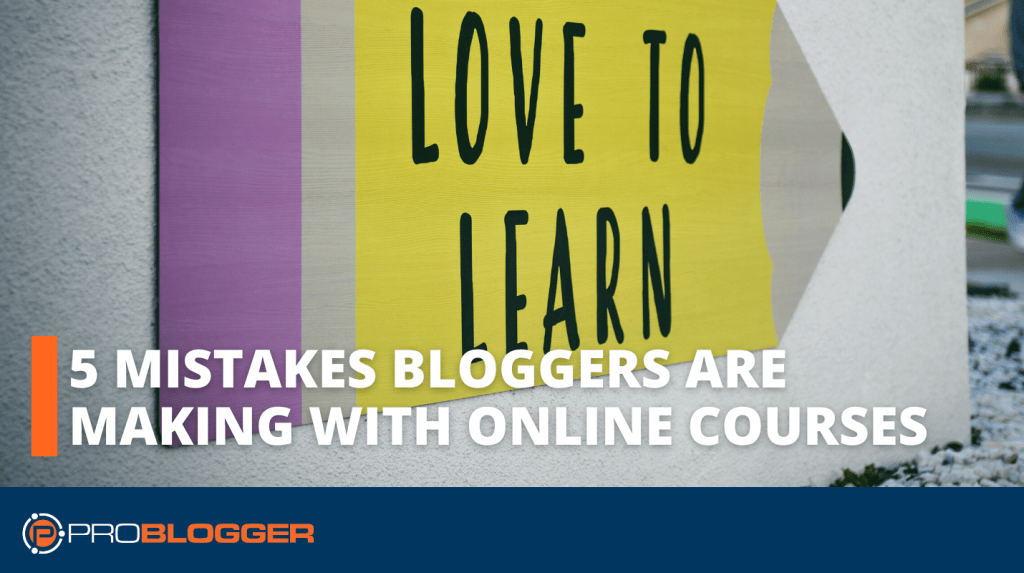5 Mistakes Bloggers are Making with Online Courses

Photo by Tim Mossholder on Unsplash
By ProBlogger expert Sam Nordberg.
Online courses are the hottest thing right now. Everyone seems to be launching their own course, and looking for ways to make what they believe is “passive income” – but here are five of the biggest makes people are making with their online courses right now:
1. Not thinking about who they are writing for
When you are creating a course, you need to think really carefully about the end user. Who are they? How much do they know already? What do they want the outcome to be? How do they want to consume the information?
If you really want people to learn from your course, and get results from it, then you need to make sure the information is carefully targeted to meet their needs.
Imagine you were writing a course on nutrition. There is a big difference between writing a course for a professional athlete who really wants to fine tune their diet, and writing a course for someone who has been clinically obese for many years, and needs a lot of support to start from scratch.
Think carefully about who you are creating the course for, before you start creating. Really focus on a single, specific need.
2. Trying to fit everything in
It took you years to learn everything you know.
One of the biggest mistakes people make when creating their own course, is to try and share all of their knowledge. I get it, you want to add value, and make sure that you give them as much as you can.
The problem is, there is no way they can absorb all of that information, and actually start to implement it, all in one go.
It took you years to develop your skills and get to where you are, it will take them a while too.
Focus on delivering smaller chunks of information, with a bigger focus on implementation (that is getting your students to actually try doing things) rather than just giving them lots of information.
3. Just recording videos and making PDFs
A course is more than just great content.
Sure, videos and PDFs are useful way to provide information to a student, but there is more to a course than simply content.
Before you start throwing together your content, consider the following:
– What support will they need?
– How will you get them actively involved?
– How will you get them to implement what they have learnt?
– How will they know if they are getting it right/wrong?
– What might they need before the course or after the course?
A course is a process, you take your students on a journey from beginning to end. Before you start to put content together, it’s worth thinking about that journey as a whole.

4. Not providing support
I’m sure you’ve seen it… you land on their sales page, and you have the two options: buy it for less money and just get the content, or pay more money and get their assistance/support/coaching to help you.
Here’s the problem… If they know that you’ll need support to help you get better results, then why don’t they make it part of the course? Why can you buy a course with no support?
One of the biggest problems with online learning is the lack of support. Students need someone to turn to. They might need help understanding the content, maybe they have technical problems, or maybe they just need to talk it over to really understand what they have learnt.
If you know that your students will need support of some kind (or simply, you know that they will get better results with support) then make sure it’s available to them.
You can look into providing a forum, or support group, having live calls, or even providing phone and email support for them.
Note: There are occasions where a course really doesn’t need support. Maybe the content is fairly basic and self-paced. If this is the case, feel free to sell the course without support.
5. Thinking courses are great passive income
Don’t get me wrong here, courses are a great way to LEVERAGE your income, and they allow you to spend your time one-to-many, rather than one-on-one, but they are certainly not passive. At least, not to start with.
As you’ve seen so far, there is more to a course than just putting your content online and charging people to access it.
You’ll need to promote your courses, help students sign up, answer any questions before, during and after, provide live support, help students to implement… and much more.
Courses are a great way to help your audience.
Courses are a great way to leverage your income.
Courses are a great way to help you monetise your knowledge.
But they are not completely passive. As with anything they require some hard work to set up, and lots of support on the way through.
You can definitely outsource some of that work, but be aware that to begin with, you’re going to be putting in some hard yards.
Courses really are a great way to grow your business, and to help you spread your message…. Just keep these simple things in mind as you start.
- Really think about who you are creating the content for and what they need to know
- Don’t try and squeeze it all in. Little bits of information that they actually use, is much more valuable than lots of information they never get around to
- Think about the whole process, not just the content
- Make sure your students get the support they need
And remember, it might be hard work to start with, but it’s definitely worth it in the end.
Sam Nordberg shows people how to take their passion and knowledge and create an online course that sells. You can learn more about her here and connect with her on Facebook and Twitter.
This article was first published July 20, 2016 and updated June 9, 2022.





